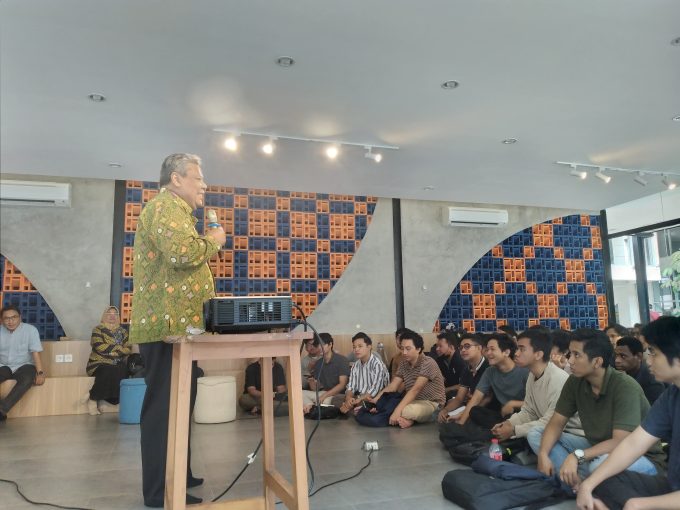
Yogyakarta, May 13th 2024─The passing of the 2024 elections does not necessarily mean the end of political contestation in Indonesia. The many phenomena during the elections have drawn criticism from various parties, including academics and political observers. The Department of Politics and Government invited Arief Budiman, Chairman of the General Elections Commission (KPU) for the 2017-2021 period, and Bambang Eka Cahya Widodo, Chairman of the General Election Supervisory Agency (Bawaslu) for the 2008-2012 period, to a public lecture on Monday (6/5).
With the theme “Enforcing the Wet Thread: The chaos of the Election Organizer Guarding the Luberjurdil Principle”, Arief explained how organizers should apply transparency for elections with integrity. “In 2019, we were able to display election result data at 98.9% of polling stations. Even for the presidential election, it was 99.8%. Whereas now we can not even see SIREKAP,” said Arief. According to Arief, elections are an event for giving the voice to the voiceless or giving voting rights to every individual, even those who may lack the opportunity to speak out.
Arief explained that there are at least three principles of elections with integrity. First, the application of ethical behavior from election participants, organizers, and even the community. Second, fairness and impartiality. Then third, transparency and accountability. According to Arief, these three things have not yet appeared optimally in the organization of elections. The use of money politics is still a common thing and is considered normal, even though it is an example of violation of ethics and election rules. Both participants, organizers, and voters have a big role in holding elections with integrity.
“The challenge of integrity is that participants, organizers, voters, government, and the election judiciary must have integrity. Integrity is not enough to say yes and no to what is right and wrong, but it must also be applied in action,” Arief explained. This includes implementing the regulations that have been set. Arief gave an example of how parties do not implement aspects of women’s representation in election nominations. Law Number 2 Year 2011 regulates the obligation of political parties to provide 30% women’s representation in the management of political parties at the central, provincial and district or city levels.
In line with this opinion, Bambang Eka Cahya Widodo also explained how the current election faces a serious problem, namely the rule of law. Throughout the implementation of the 2024 Election, there were various uncontrolled regulatory changes. It was even done in the days leading up to the closing of the registration of election candidates. Bambang explained that countries with democratic principles agree that ideally a year before the election there should be no changes in regulations. This provision is made so that the competition in the election is balanced.
“So, it is useless to say competition if the rules change. But in our case, three days before registration, the rules were changed. Miraculously, the KPU did not change the rules, but accepted the registration,” added Bambang. According to him, the nomination should have been considered invalid if there was no sudden change in regulations. The incident is enough to indicate that elections need to reaffirm the rule of law.
Realizing elections with integrity requires commitment from various elements involved, including the community. For this reason, understanding of the sovereignty and rights of voters in democracy in elections needs to be conveyed massively, so that people able to use their voting rights properly. This public lecture of DPP FISIPOL UGM is one of the contributions of FISIPOL UGM in realizing elections with integrity, as well as strong institutions as stated in the 16th Sustainable Development Goal.
